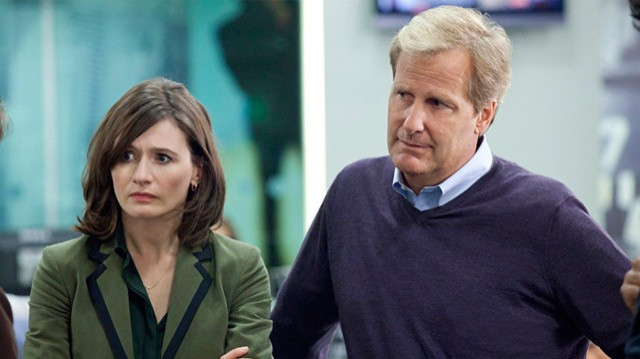'The Newsroom' Season 2: Has Aaron Sorkin Solved His ‘Women Problem’?

Aaron Sorkin clearly paid attention to some of the criticisms of “The Newsroom,” which surprised its hate-watchers when it was renewed by HBO for a second season. The pedantic self-importance has been somewhat muzzled, Will McAvoy (Jeff Daniels) is a little more anti- and a little less hero, and we are permitted to see the newsgathering process unfold a bit more realistically than in the first season – thought still with the narrative advantage of hindsight, as once again the headlines are regurgitated from the recent past. (One outlier, the so-called Genoa black op, is based on a botched 1998 CNN segment, according to the Daily Beast’s Andrew Romano.)
Slight improvements have been made to the portrayal of women on the show, but they are as obvious and shallow as Sorkin’s stale, tone-deaf stereotyping. Last year, much of the criticism focused on Emily Mortimer’s Mackenzie McHale, an executive producer given to amateur fumbles and needy emotional displays. In the season two premiere, “The First Thing We Do, Let’s Kill All The Lawyers,” Sorkin makes a production of demonstrating Mackenzie’s competency in the control room when she saves a broadcast with a seamlessly executed overdub. That scene served very little purpose other than to prove to us that Mac is good at her job, which was presumably Sorkin’s way of letting us know that he thinks women can function as something other than supporting players to their more successful male counterparts. The problem is I’m pretty sure he doesn’t.
Mac’s momentary heroism appears to have given Sorkin and his writers permission to marginalize the other female players, and to reinforce Mac’s neediness once again, in a scene where she forgets her purse so that Will can bail her out with cab fare – there was no other narrative use of the oversight, except maybe to reinforce Mackenzie’s ditziness. Maggie (the talented Alison Pill) is still spinning her wheels in an inane love triangle/trapezoid that comes to a head after an out-of-control, weepy rant she made a few weeks earlier – on a “Sex and the City” tour bus, to boot – makes its way to YouTube (and Don’s inbox.)
But it leads to a scene that manages to make the most of Sorkin’s sexism: An absurd sequence that finds Maggie and Sloan (Olivia Munn) negotiating with a “Sex and the City”-obsessed blogger in a Queens laundromat succeeds in being rather funny. Using “Sex and the City” as a signpost for urban female sensibilities is about as inspired as having an aging broadcaster unwind from a stressful day with a joint and Van Morrison – we get that too – but something about the delivery of the laundromat scene makes the women look far less ridiculous than they could. It’s probably in part due to the inside-baseball reference to SATC’s Charlotte York – Sorkin briefly dated Kristin Davis last summer – but there was a welcome winking in this scene, as though the girls knew how silly the whole thing was, and were asking us to please play along for the moment, like they were.
Munn, for reasons I don’t fully understand, is a polarizing figure – I think it’s because she parlayed her obvious sex appeal to break into typically male-dominated television terrain: In 2006, Munn was hired to co-host “Attack of the Show” on the G4 network, and followed that up with a brief stint as a “Daily Show” correspondent. In this sense, Munn may be the best equipped to navigate the behind-the-scenes sexual politics in “The Newsroom” – she appears to be aware that in real life, as in “The Newsroom,” brains and beauty are not quite as compatible as the platitudes would have us believe. While Sloan, a supremely skilled economist, is easily the most empirically intelligent among the women (and maybe everyone) in “The Newsroom,” she’s not immune to demeaning characterizations – in the second episode, she salivates over the description of a walk-in closet, and in the season premiere, Charlie Skinner tries to playfully insult her with the nickname “Money Skirt.” But it rolls right over her, and she gets the last word, even if Charlie doesn’t know it. (Sloan does make nerds look good.)
It takes an actress like Munn, who is as talented as she is game, to engage deftly with the “Newsroom”’s problematic gender typing, without being swallowed by it (as Mortimer sometimes can), and without making a big show of subverting it. If only Sorkin could take a cue and get out of his own way.
© Copyright IBTimes 2024. All rights reserved.






















